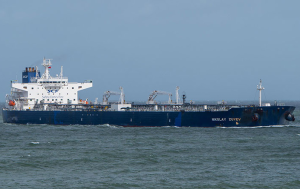UK Helped Shape ‘Shadow Fleet’ Due to Sanctions, Says Sovcomflot:
Sovcomflot, a Russian government-controlled shipowner, blames UK sanctions for the growth of a “shadow fleet” of substandard tankers transporting Russian oil. The company claims that sanctions, imposed after Russia’s invasion of Ukraine, have led to the exclusion of Sovcomflot vessels from UK and G7 markets, resulting in increased reliance on less regulated, anonymously owned vessels, which compromise maritime safety. Sovcomflot defends its operations as compliant with international law and denies its ships are part of this fleet. The UK recently sanctioned 10 more Sovcomflot tankers, bringing the total to 37 under Western restrictions. The company criticizes the sanctions, asserting they destabilize maritime safety and increase the risk of incidents, further complicating global oil trade.

Hafnia Unable to Find Owner or Insurer of Iran-Linked Tanker Ceres I:
Hafnia has been unable to directly contact the owner, manager, or insurer of the Iran-linked tanker Ceres I since its product tanker Hafnia Nile collided with the vessel in the South China Sea on July 19. Although contact has been made with Singaporean lawyers for the Ceres I‘s hull underwriters, Hafnia is still unable to identify the beneficial or registered owner, which is linked to a single-ship company in Hong Kong. The Ceres I, involved in multiple Iranian oil shipments, fled the accident scene but was intercepted by Malaysian authorities. Despite damage to Hafnia Nile, the cargo was safely transferred, and the vessel was towed to Singapore for repairs. The incident underscores the risks of the “dark fleet” of anonymously owned tankers involved in sanctioned oil trades from Iran, Russia, and Venezuela.
G7 Price Cap Weakened as Oil Falls and Russia Resumes Sanctioned Tankers:
The price of Russia’s Urals crude fell below the G7’s $60 per barrel price cap for the first time in 10 months, weakening the cap’s impact. The cap, designed to limit Russia’s oil revenues while keeping oil flows intact, has been circumvented by a “dark fleet” of tankers carrying Russian oil to countries like Türkiye, India, and China. Adding to this, five cargoes were shipped on US- and EU-sanctioned Sovcomflot tankers in August. The reintroduction of these sanctioned vessels has boosted Russia’s oil exports, with 23% of crude shipped on Sovcomflot tankers in August. Dark fleet tankers accounted for nearly two-thirds of crude and condensate volumes shipped last month, showing little change from previous months.
Russian Missile Strikes Vessel Leaving Ukraine:
A merchant ship carrying wheat was struck by a Russian missile shortly after departing from a Ukrainian Black Sea port, according to Ukrainian President Volodymyr Zelenskyy. The vessel, en route to Egypt, was hit outside Ukraine’s territorial waters, though no casualties have been reported. The attack occurred during a broader assault on Ukraine’s Odesa region. Zelenskyy emphasized the importance of Ukraine’s food exports to Africa and the Middle East. Ukraine’s Black Sea maritime route, operational for a year, has allowed grain exports despite ongoing Russian threats. Previous incidents include a missile strike on the bulk carrier KMAX Ruler that killed a Ukrainian pilot.
Dark Fleet Tanker Mando One Anchors Off Italy:
The tanker Mando One, linked to a fleet of US- and UK-sanctioned vessels, has been anchored off Civitavecchia, Italy, since September 6 without unloading its Malaysian cargo of diesel. This vessel is part of the “dark fleet,” which circumvents sanctions and typically avoids European waters. Previously, Mando One exclusively shipped Russian refined products and was part of a now-dismantled fleet managed by sanctioned entities in Dubai. The ship recently changed management to Breath Shipping Services LLC and operates under various newly-formed, anonymous entities. Notably, Mando One made headlines in August 2023 when an Indian seafarer went missing during its voyage through Danish waters. The ship’s owner, charterer, and cargo owner remain unidentified.



